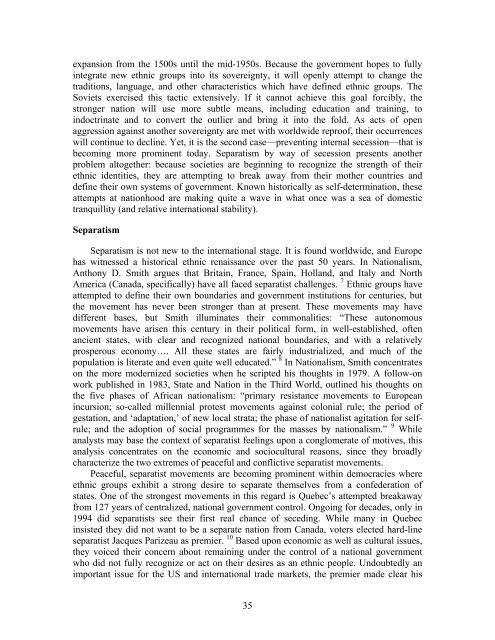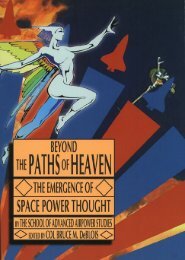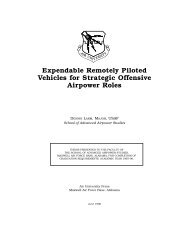Global Security Concerns - Project Gutenberg Consortia Center
Global Security Concerns - Project Gutenberg Consortia Center
Global Security Concerns - Project Gutenberg Consortia Center
You also want an ePaper? Increase the reach of your titles
YUMPU automatically turns print PDFs into web optimized ePapers that Google loves.
expansion from the 1500s until the mid-1950s. Because the government hopes to fully<br />
integrate new ethnic groups into its sovereignty, it will openly attempt to change the<br />
traditions, language, and other characteristics which have defined ethnic groups. The<br />
Soviets exercised this tactic extensively. If it cannot achieve this goal forcibly, the<br />
stronger nation will use more subtle means, including education and training, to<br />
indoctrinate and to convert the outlier and bring it into the fold. As acts of open<br />
aggression against another sovereignty are met with worldwide reproof, their occurrences<br />
will continue to decline. Yet, it is the second case—preventing internal secession—that is<br />
becoming more prominent today. Separatism by way of secession presents another<br />
problem altogether: because societies are beginning to recognize the strength of their<br />
ethnic identities, they are attempting to break away from their mother countries and<br />
define their own systems of government. Known historically as self-determination, these<br />
attempts at nationhood are making quite a wave in what once was a sea of domestic<br />
tranquillity (and relative international stability).<br />
Separatism<br />
Separatism is not new to the international stage. It is found worldwide, and Europe<br />
has witnessed a historical ethnic renaissance over the past 50 years. In Nationalism,<br />
Anthony D. Smith argues that Britain, France, Spain, Holland, and Italy and North<br />
America (Canada, specifically) have all faced separatist challenges. 7 Ethnic groups have<br />
attempted to define their own boundaries and government institutions for centuries, but<br />
the movement has never been stronger than at present. These movements may have<br />
different bases, but Smith illuminates their commonalities: “These autonomous<br />
movements have arisen this century in their political form, in well-established, often<br />
ancient states, with clear and recognized national boundaries, and with a relatively<br />
prosperous economy…. All these states are fairly industrialized, and much of the<br />
population is literate and even quite well educated.” 8 In Nationalism, Smith concentrates<br />
on the more modernized societies when he scripted his thoughts in 1979. A follow-on<br />
work published in 1983, State and Nation in the Third World, outlined his thoughts on<br />
the five phases of African nationalism: “primary resistance movements to European<br />
incursion; so-called millennial protest movements against colonial rule; the period of<br />
gestation, and ‘adaptation,’ of new local strata; the phase of nationalist agitation for selfrule;<br />
and the adoption of social programmes for the masses by nationalism.” 9 While<br />
analysts may base the context of separatist feelings upon a conglomerate of motives, this<br />
analysis concentrates on the economic and sociocultural reasons, since they broadly<br />
characterize the two extremes of peaceful and conflictive separatist movements.<br />
Peaceful, separatist movements are becoming prominent within democracies where<br />
ethnic groups exhibit a strong desire to separate themselves from a confederation of<br />
states. One of the strongest movements in this regard is Quebec’s attempted breakaway<br />
from 127 years of centralized, national government control. Ongoing for decades, only in<br />
1994 did separatists see their first real chance of seceding. While many in Quebec<br />
insisted they did not want to be a separate nation from Canada, voters elected hard-line<br />
separatist Jacques Parizeau as premier. 10 Based upon economic as well as cultural issues,<br />
they voiced their concern about remaining under the control of a national government<br />
who did not fully recognize or act on their desires as an ethnic people. Undoubtedly an<br />
important issue for the US and international trade markets, the premier made clear his<br />
35






